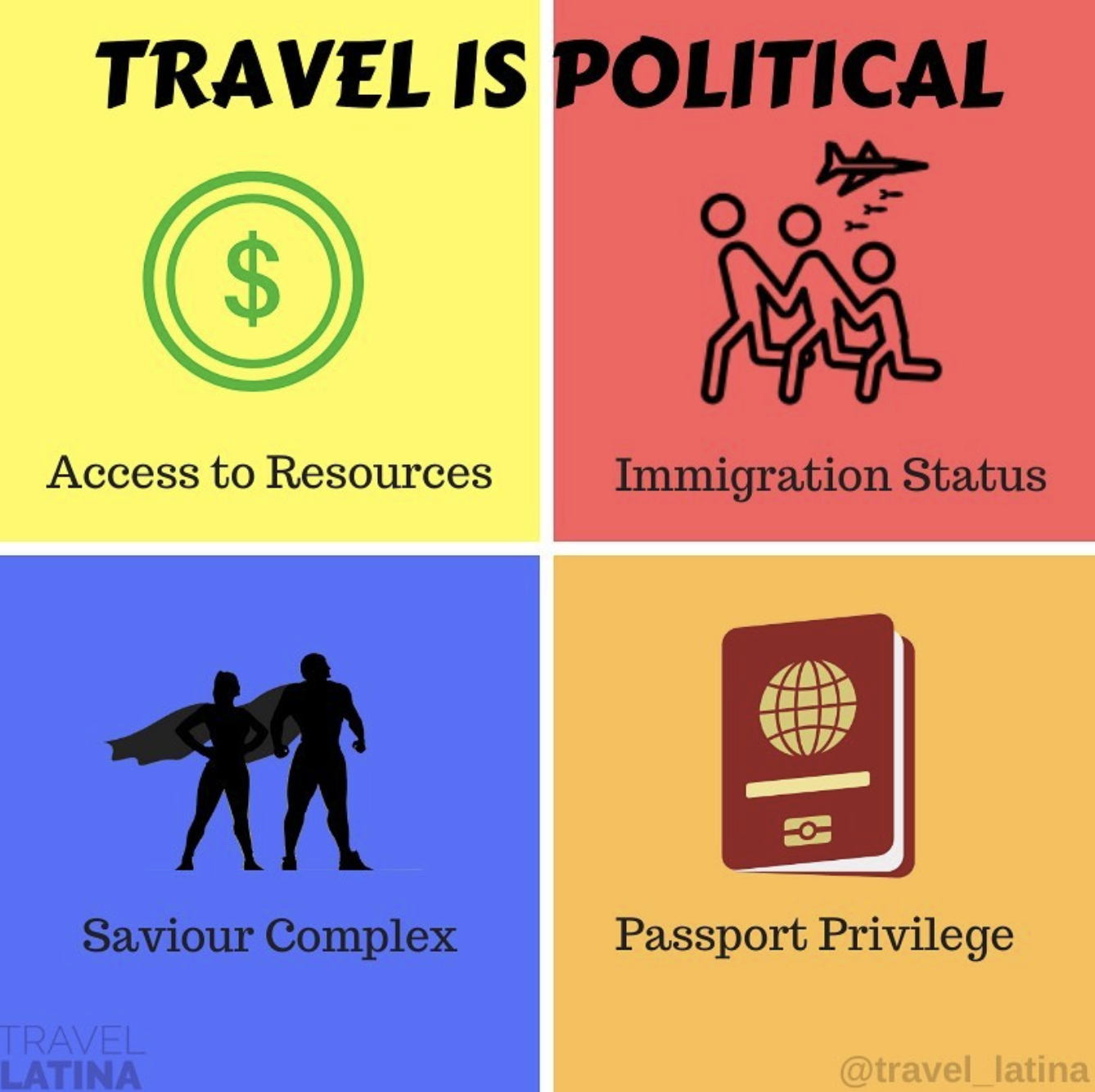TRAVEL IS POLITICAL
By: Alexandra Tracy
I'm getting tired of people telling us to keep politics out of our page. Newsflash people, travel is political. Most things in life are inherently political, whether you want to accept it or not. Communities, schools, work, religious groups, sports, and even families all have some sort of political occurrences in their structures, interpersonal interactions, and more. Yes, it's annoying and greatly concerning how much division and anger the uncomfortable topic of "politics" can create. We despise when people take sides, like sports teams, instead of seeing the need to help the most vulnerable or marginalized people.
So how is Travel Political? Let's dive in:
1) Access to Resources: if a group has generational wealth or greater access to resources than other groups, they have greater access to leisure time to relax and more privilege and liberty to plan and pay for leisure like travel. Policies and laws established by politicians have historically impacted who has greater access to resources over others.
2) Immigration Status: people have traveled across oceans, mountains, and rivers to seek a better and/or safer life since the dawn of humanity. Animals do this to survive. It's unfair to label someone as "illegal" and "criminal" when they may have had to uproot their whole family and life from one country due to war, poverty, environmental collapse, discrimination, disease, etc. The USA was founded by the colonization of European immigrant settlers who rampaged Native American communities and benefited financially from forced enslavement and migration of Africans. The USA has also created issues by meddling in other countries' politics, like in Central America, or Palestine-Israel, of which has caused the huge waves of migration of refugees from those regions. People's movement will never end so long as there are incentives and freedom to do so, whether it is for survival, or whether it's for leisure. Topics of migration, immigration, refugees are travel-related and significantly impacted by policies and laws.
3) Saviour Complex: The idea of "saving poor unfortunate souls" is nothing new. Christianity wiped out indigenous tribes, their culture, and spiritual practices worldwide because they were deemed savage, inferior, and evil. European monarchies were closely allied with the Catholic and Protestant churches because together, they held greater power and wealth. Therefore, religion in those times was highly political. Nowadays, when most prefer to see a separation of Church and State, we still observe that people like to travel to feel better about themselves and get the feeling they are making a difference. Some examples of this can be seen by trips planned to convert Africans to Christianity or clean up trash with a non-religious organization. But how much are their efforts hurting versus helping and centering the more privileged person's experience? Shouldn't their wealth and efforts be used in political power to help sway policies that have a much more significant impact on people abroad? There are also highly political non-religious organizations that perpetuate the Saviour Complex, like the US government's Peace Corps or the US Department Agency International Development (USAID). This mindset not only shapes a culture of what is seen as charitable giving through travel, but it also shapes foreign policy and laws abroad.
4) Passport Privilege: This one almost goes hand in hand with immigration status and access to resources. Are you a citizen who can afford to buy a passport and use it? Do you have legal status that allows you to receive a passport? Does your country passport allow entry into all countries? Or does your country's standing in the world only grant you and your passport access to a select few countries? The citizens of Japan and Singapore have the most passport privileges as they are able to visit 189 countries each. In comparison, Afghanis have the worst passport privilege as they are only able to visit 25 countries. Politics shape the policies and laws that shape our passport privilege in the world.
In conclusion, there is no doubt that travel is political. We stand for ethical, sustainable, educational, and conscious traveling. We cannot stay silent about injustices, especially if they negatively impact our communities, vulnerable communities like BIPOC/ LGBTQ+ / low-income/ disabled, the environment, and ultimately ANY travel experience (whether forced immigration or for leisure). Many of us have a voice and ability to sway our political representatives, boycott unethical products or companies, and more. We remain a non-party affiliated platform with a strong desire to encourage holding our politicians accountable no matter which party - and even if one side needs accountability A LOT more often.
Did we miss any important subtopics to this topic? Please add your take on this subject in the comments below.
